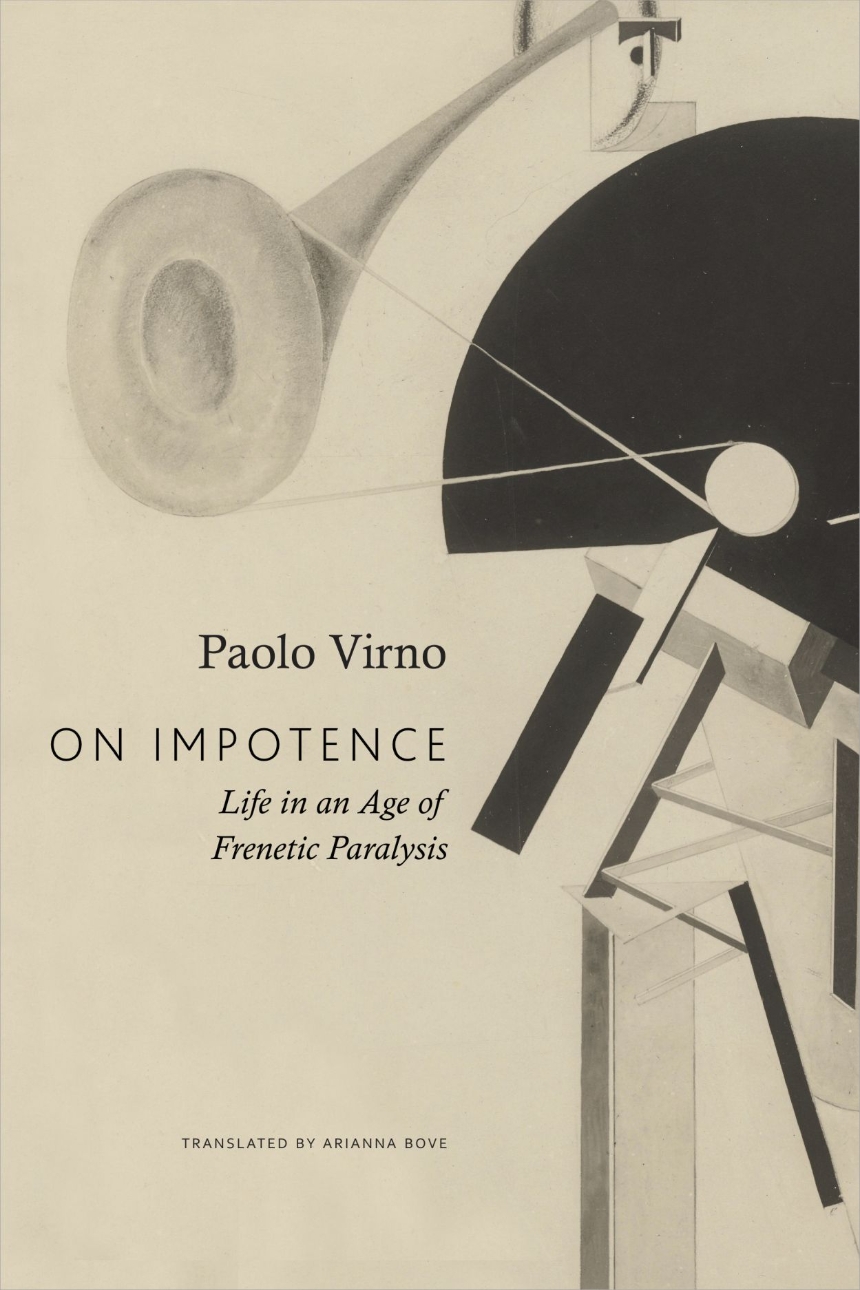An incisive and urgent book that explores the hidden roots of our contemporary powerlessness.
Contemporary life is marked by a paradoxical form of impotence. Whether in love, labor, or political struggle, we often find ourselves locked in a state of frenetic paralysis—unable to act as we wish or to endure what confronts us. This impotence is not born of lack, but of excess: an abundance of skills, capacities, and opportunities that, instead of taking form as coherent actions or speech, stagnate and turn in on themselves. In this thought-provoking meditation, philosopher Paolo Virno examines this strange impotence through the lens of classical thought, drawing especially on Aristotle and Marx.
To overcome this troubling state, Virno calls for a collective search for a shared spiritual and practical exercise aimed at reclaiming agency. He argues that only by learning to renounce renunciation can we cultivate deliberate words and timely decisions.
Contemporary life is marked by a paradoxical form of impotence. Whether in love, labor, or political struggle, we often find ourselves locked in a state of frenetic paralysis—unable to act as we wish or to endure what confronts us. This impotence is not born of lack, but of excess: an abundance of skills, capacities, and opportunities that, instead of taking form as coherent actions or speech, stagnate and turn in on themselves. In this thought-provoking meditation, philosopher Paolo Virno examines this strange impotence through the lens of classical thought, drawing especially on Aristotle and Marx.
To overcome this troubling state, Virno calls for a collective search for a shared spiritual and practical exercise aimed at reclaiming agency. He argues that only by learning to renounce renunciation can we cultivate deliberate words and timely decisions.
160 pages | 6 x 9 | © 2026
Philosophy: Philosophy of Society, Political Philosophy
Sociology: Social Change, Social Movements, Political Sociology
Table of Contents
1. The Trouble with Abundance
1.1 A Surplus of Potential
1.2 Aristotle vs the School of Megara
1.3 To have ‘dynamis’
1.4 Misunderstandings
1.5 Genealogy of impotence
2. The Art of Suffering
2.1 How to Weather the Winds of Fate
2.2 The Actions of Sufferers
2.3 Welcoming, Withdrawing, Adhering, Resisting
2.4 The Collapse of Reception
2.5 A menage a trois
3. Omissions and Renunciations
3.1 Negative Actions
3.2. Proclaiming a State of Impotence
3.3 The Faculty to Suspend
3.4 On Limit
3.5 Omitting Omissions, Renouncing Renunciations
3.6 Political-theological Note
4. Two Kinds of Habit
4.1 Modes of Possession
4.2 The ever-present in-between
4.3 Managing or Using Potential
4.4 Civil War
5. An Incumbent Infinity
5.1. Archaic Representations
5.2. The Misadventures of Use Grappling with Boundlessness
5.3 The Primacy of Relation
5.4. Action comes last
5.5. From Task to Performance
5.6. Physiognomic Gloss
6. Institutions
6.1 Provisional Moral (of the Story)
6.2 The Good Government of Infinity
6.3 The Ambivalence of the Institution: an Exercise of Use and a Usable Thing
6.4 Techniques, Experiments, Ideas
6.5 The Subversion of Hexis-management
6.6 On the Institutional Meaning of Renunciation
6.7 Endgame
1.1 A Surplus of Potential
1.2 Aristotle vs the School of Megara
1.3 To have ‘dynamis’
1.4 Misunderstandings
1.5 Genealogy of impotence
2. The Art of Suffering
2.1 How to Weather the Winds of Fate
2.2 The Actions of Sufferers
2.3 Welcoming, Withdrawing, Adhering, Resisting
2.4 The Collapse of Reception
2.5 A menage a trois
3. Omissions and Renunciations
3.1 Negative Actions
3.2. Proclaiming a State of Impotence
3.3 The Faculty to Suspend
3.4 On Limit
3.5 Omitting Omissions, Renouncing Renunciations
3.6 Political-theological Note
4. Two Kinds of Habit
4.1 Modes of Possession
4.2 The ever-present in-between
4.3 Managing or Using Potential
4.4 Civil War
5. An Incumbent Infinity
5.1. Archaic Representations
5.2. The Misadventures of Use Grappling with Boundlessness
5.3 The Primacy of Relation
5.4. Action comes last
5.5. From Task to Performance
5.6. Physiognomic Gloss
6. Institutions
6.1 Provisional Moral (of the Story)
6.2 The Good Government of Infinity
6.3 The Ambivalence of the Institution: an Exercise of Use and a Usable Thing
6.4 Techniques, Experiments, Ideas
6.5 The Subversion of Hexis-management
6.6 On the Institutional Meaning of Renunciation
6.7 Endgame

